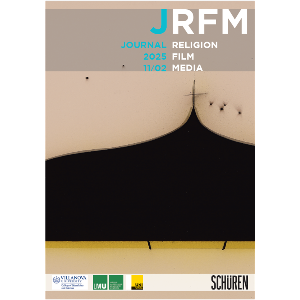Journal for Religion, Film and Media



The Journal for Religion, Film and Media is a peer-reviewed, open access, online publication. It offers a platform for scholarly research in the broad field of religion and media, with a particular interest in audio-visual and interactive forms of communication. It engages with the challenges arising from the dynamic development of media technologies and their interaction with religion in an interdisciplinary key. It is published twice a year, in May and November.
JRFM is edited by a network of international experts in film, media and religion with professional experience in interdisciplinary research, teaching and publishing, linking perspectives from the study of religion and theology, film, media, visual and cultural studies, and sociology. It is published in cooperation between different institutions in Europe and the USA, particularly the University of Graz, the University of Munich and Villanova University, in cooperation with the Schüren publishing house in Marburg. JRFM is published also as a print-on-demand.
Journal for Religion, Film and Media
Chief editors
Stefanie Knauss, Villanova University
Alexander Darius Ornella, University of Hull
Daria Pezzoli-Olgiati, University of Munich
Christian Wessely, University of Graz

Heft 11.2 ab 15. November online!
Issue Editors: Martina Bär and Franz Winter
For decades now, the cinematic and televisual depiction of Islam in the Western media has often been reduced to a narrow set of negative stereotypes closely linked to the infamous 9/11 incident. As film and television play a powerful role in shaping public perceptions of Islam and Muslims, recent scholarship has
emphasized the need to examine these representations more critically and to highlight alternative voices, that represent the rich traditions and practices of Islam. This issue offers a wide-ranging collection of studies on how Islam and Muslims are depicted on screen with a general focus on recently released films. Contributions address diverse topics, including Shia traditions in Iranian and international cinema, Palestinian filmmaking and questions of gender and identity, as well as Muslim diasporas in Europe or the United States, and the aesthetic strategies of self-orientalism. Together, they shed light on the interplay of religion, culture, and media, offering fresh perspectives on various aspects of the way, Islam, its rich tradition, and Muslims are portrayed in TV series and movies.
The issue can be downloaded at JRFM or can be ordered in print from Schüren.